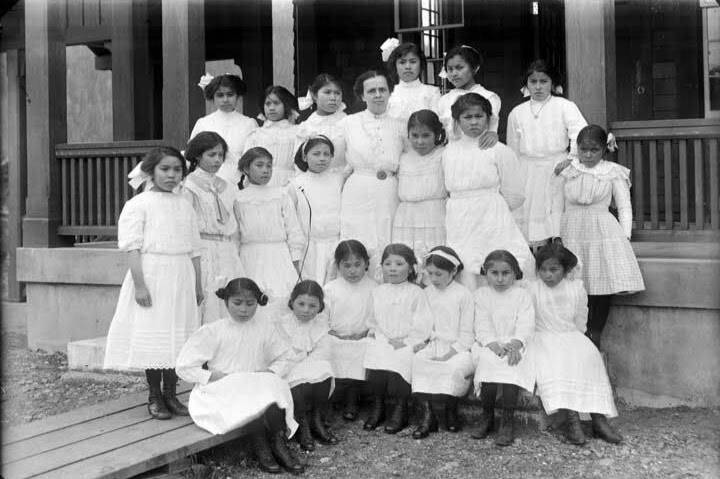Survivors of boarding schools for Indigenous people will have the chance to share their stories this week during the First Alaskans Institute’s virtual summit on the issue.
The goal of the summit is to provide survivors, their relatives, community members and others impacted by the boarding school system, said FAI President La quen náay Liz Medicine Crow.
“It’s a safe and very serious place for the truths to be shared by the people who have experienced the impacts and the ongoing impacts,” Medicine Crow said. “They will be listened to, they will be heard.”
Medicine Crow said the group was using the terms boarding or residential schools to broadly refer to the various institutions that took Indigenous children away from their families. The attempt to destroy Indigenous culture has had lasting generational impacts, Medicine Crow said, particularly in the loss of language and cultural practices.
According to the Alaska State Archives, the first boarding school in Alaska was founded by Presbyterian missionaries in Sitka in 1878. The federal Bureau of Indian Affairs was involved in the operation of boarding schools for over a century, according to the bureau. Many schools, including boarding schools in Southeast Alaska, operated well into the 20th century.
“Historic boarding schools for Alaska Natives were established by American newcomers (sometimes referred to as invaders or colonizers) to detribalize and assimilate Indigenous people into Euro-American culture,” according to the state.
[PFD formula proposals provoke strong public reaction]
The meetings were inspired by the discovery last year of hundreds of unmarked graves —mostly of Indigenous children — in Canada where similar programs were put in place. According to the Associated Press, the remains of 215 children were discovered at the former site of Canada’s largest boarding school in British Columbia in May 2021. A month later in June more than 600 unmarked graves were found at another former school site in British Columbia, AP reported.
“We’re seeing this unfolding on social media with no forum to talk about it,” Medicine Crow said.
The forum will not be open to the public, Medicine Crow said, as participants may share deeply personal and possibly traumatic details. The testimonies may eventually be made public, Medicine Crow said, but only after participants have reviewed and approved the video.
The purpose of the event was truth and healing, Medicine Crow said, referring to those who would be giving testimony as “truth providers.”
“We acknowledge that there are boarding school survivors still alive and with us,” Medicine Crow said. “There are the communities and the cultures and the language groups that were severely impacted.”
While not open to the general public, Medicine Crow said those interested in joining or providing assistance should email FAI at anpc@firstalaskans.org. The summit begins Monday evening but the bulk of the event takes place Tuesday through Thursday starting at 9 a.m.
Even though the summit is virtual, medical professionals Indigenous healers will be present to help participants that may have a strong emotional reaction. Last week, FAI held an online session helping to prepare participants emotionally for the summit.
“Doing this virtually is a challenge but also not having a forum is a challenge,” Medicine Crow said. “Talking about these things is one of the things that has not really happened yet. We’re living in the shrapnel of pain and trauma of what colonization has done.”
• Contact reporter Peter Segall at psegall@juneauempire.com. Follow him on Twitter at @SegallJnuEmpire.

